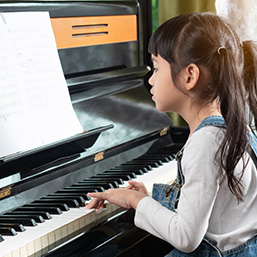
The time has come. Your child sings and hums all the time, dances around the house, and expresses themselves with music everywhere they go. As parents, we want to encourage this, so we think – music lessons!
The best time to get a jump start on music is when a child is young. Music can present so many opportunities for creativity and allows for a variety of avenues of learning. There are multiple studies available with a quick Google search stating the benefits of learning music.
So, where do we begin? There are many factors to consider, including budget, fitting other activities in, and incorporating practice time into an already busy schedule. We will often be asked the question, what instrument should we start with? There really is no one correct answer to this, and there are various factors involved in deciding. One of the best places to start is the instrument the child expresses the most interest in. The genre of music they find most appealing can also play a part. And, of course, the physical size of both the child and the instrument need to be taken into consideration. It would be almost impossible for a five-year-old to try to hold, or have the developed breath and diaphragm control needed, to play a tuba! There are always exceptions to every rule, but size definitely plays a determining factor. A variety of instruments are available in fractionable sizes to better accommodate different physical needs. Some examples of these include violins, guitars, and drum sets. If a young child shows a definite interest in the violin, we can make that happen! Keyboards could potentially be an optional starting point for those without the space or budget for a piano, however, getting fingers onto weighted, full-size keys is also important for proper technical development.
If a young child has been exposed to a number of different instruments, either via video or live performances, they may have a genuine interest in an instrument they have heard or seen. Perhaps a child is not really sure of the instrument they would like to learn. This is perfectly normal as well. We do not need to make a lifetime choice for them. Most instruments can be rented short term, or on a monthly or yearly basis so you can have your child try a number of different instruments to help discover where their connection really lies, without making a big commitment. Piano is always a great choice as a beginner instrument since we learn the basics of melody and harmony, and can be a great jumping-off point to another instrument if interests change.
If they have not had the opportunity to see a variety of instruments played, try to find ways to explore this together. Check out YouTube for videos presenting different instruments and their sound and characteristics. Listen to different recordings or view live performances. Visit a music store to see many instruments up close, and maybe even try a few! At Long and McQuade, we encourage our customers to try many different instruments while they are in our stores. The more exposure to the vast number of instruments we can provide to young minds, the better the chances that something jumps out at them.
If we start a child in music with an instrument they are excited about before they even begin lessons, that’s when the magic really happens and we set them up for the best chance of success. Learning about an instrument, its history and how it was made, how we properly care for it, how the tone or sound is produced, and how we as a player manipulate it to create music, are all part of the learning process. A great teacher will involve all of this as part of the journey of discovering music and their instrument.
As students progress in learning, the instrument allows music to become an outlet. A way of expressing themselves, a source of joy in discovery, and even allows for an escape when needed. The instrument can begin to feel as an extension of the musician, almost a part of us. If students are performing for others, they can feel as if they are sharing the stage with their best friend. This helps them to feel more relaxed and confident in their playing, reducing any performance anxiety they may be feeling.
Musicians invest a great deal of time with their instrument and this in itself fosters a comforting sense of familiarity. Feeling connected to the instrument allows a student to go beyond the music notes. The student and the instrument can become inseparable companions and a special bond is formed. They begin to look forward to their practice time together, and practice time becomes play time.
Choosing to begin music lessons can be a big decision for any family. Connecting with the right instrument and teacher are essential steps to building a solid foundation in all young students and will go a long way to building a lifetime love of music.
Doug is the Regional Lessons Manager - Western Canada - for Long and McQuade Musical Instruments.
See our related articles:
Calgary’s Child Magazine © 2024 Calgary’s Child